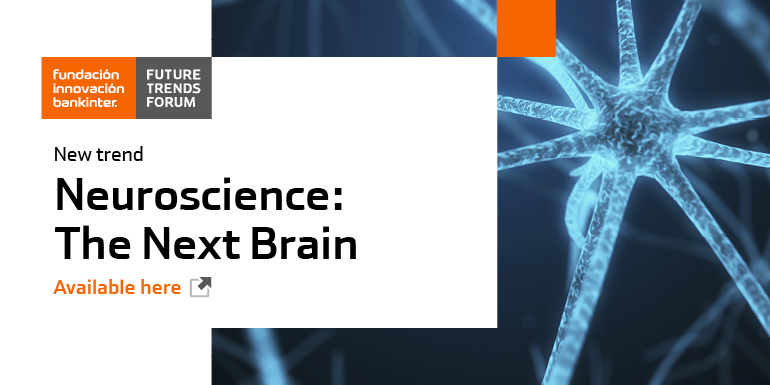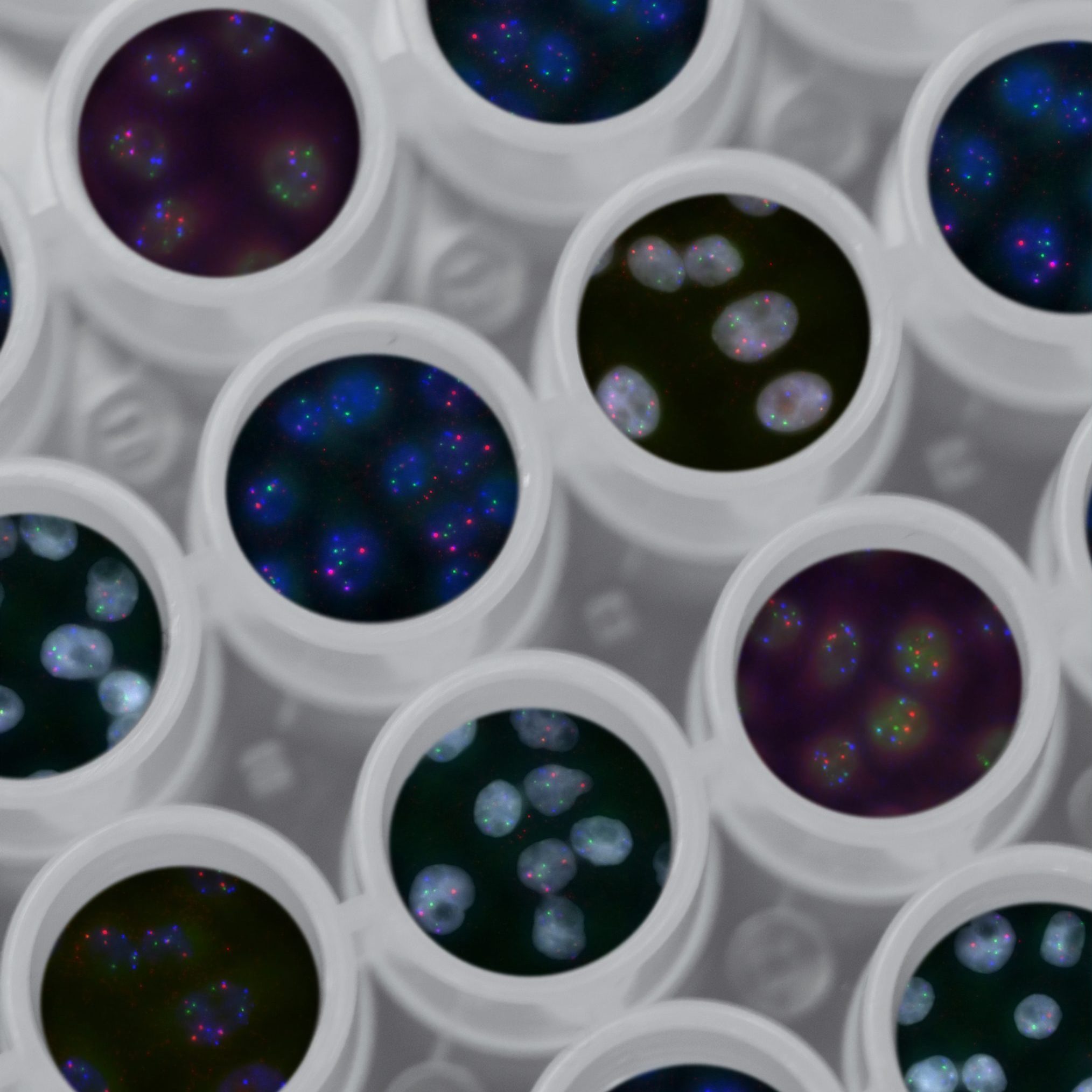Future of neuroscience
The future of neuroscience

How can advances in the study of neuroscience change our lives 10 years from now? The experts gathered at the Future Trends Forum are located in 2030 to visualize different possible scenarios.
As we have seen, companies are already focused on the developments we will see in the next years, which are all related to new treatments for diseases, improved health, increase in well-being, information analysis and device personalization. So, they’re useful for several groups. Research processes are slow and still need to overcome several challenges regarding the regulation of new technologies and their use in humans. However, the Future Trends Forum experts predict that some developments in neuroscience in the next few years will change many peoples’ lives.
1. Evolution in Neuroimaging Techniques in neuroscience
In the last few years, the development of brain observation technologies has been exponential. Experts predict that these systems will continue to be developed. We keep acquiring new knowledge, but, by 2030, technological development will allow us to have more information about different types of brain cells and their connections. We will acquire this knowledge thanks to evolved neuroimaging techniques, which will presumably improve thanks to the development of optical signals.
Given the fact that the brain is still a mystery, development of these techniques of neuroscience is very promising: it will allow us to know more about the types of neurons and how they connect with each other. It will also allow us to go deeper into connection patterns and their relationship with different disorders. Lastly, it will allow us to unravel the functioning of different mental processes such as memory or sleep, which is involved in many pathologies.
2. A Different Treatment for Everyone
In the last few years, the word ‘personalization’ has been increasingly popular in the technological field, like the personalization of advertising to obtain more sales or the personalization of entertainment content to match the users’ taste. but the one field where personalization can save lives, that’s healthcare. That is why experts agree that by personalizing treatments, we can adapt them to each patient’s specific needs. Depression affects everyone in a different way, at a biological level as well.
We will soon see the development of technological tools that will predict disorders and will therefore allow us to manage them better. We will treat every single human in a different way, and we will personalize and design tailor-made treatments for everyone, in the field of mental health, for instance. As we said, depression is different depending on the patient. That will motivate us to find a way to identify concrete, individual aspects about it, as well as specific ways to address it. But we must overcome certain challenges: how can we handle ethical issues involved in predicting a disorder? How will this new knowledge affect people and society?
3. More Knowledge, Improvement for Everyone
According to experts, technology will help us unravel the mystery of the human brain.
Technology will help us unravel the human brain.
Even though knowledge has a less direct impact on society, it will allow us to keep researching and finding innovative solutions and more efficient ways to treat disorders. And speaking of the development of knowledge: by 2030, there will be more university graduates than now in the world. However, according to experts, in-class work will be done increasingly online, and graduates could obtain their degrees in just one year. Matthew Hudson, a science journalist for Science magazine, adds that one of the reasons for it is that by then 90% of the world’s population will have access to the Internet.
4. Enhanced Humans
This knowledge, on top of personalizing treatments and finding new more efficient ones, can also be used to select and improve the lives of healthy individuals. Smart sensors and the development of neurotechnology-based wearables will contribute to the enhancement of human capabilities. These will be developed to the point that some experts believe that humans will be able to communicate telepathically by 2050. But before we get there, experts predict that augmented communication and smart devices will help reduce loneliness and increase the autonomy of disabled people. They also believe that consumers will widely adopt cognitive- and emotional-well-being technologies to face their daily challenges and improve their quality of life.
5. Closer to Regulation of neuroscience
These ideas about enhancing human capabilities always have great ethical implications. For example, how do we use technology that analyzes the brain to decide who is worthier of attending college? To what extent should technology be used to improve intellectual performance? Where’s the limit? Will we become super humans? Experts predict that the industry will be regulated in a balanced manner regarding the use of endophenotypes in education, employment, and other social aspects.
6. Healthcare through Devices
Knowledge will have the greatest impact on the field of technology development for disorder treatment and improvement in citizens’ quality of life. Throughout history, technological research and development has significantly reduced the number of patients who die from disorders. These illnesses used to be fatal but can now be treated.
This knowledge will result in the creation of mobile technology that is accessible everywhere, like wearables. This will have an impact on education, telemedicine, disorder diagnosis and even finance. More specifically, these technologies might affect healthcare, since symptoms will be monitored and treated remotely. This understanding will also lead to improvements in education, which will be personalized for students depending on their capabilities. Mental health will be treated more adequately, since we will be able to prevent mental issues even before patients need to request medical treatment. We will also see an increase in our well-being by developing devices that will help us track our health conditions daily.
7. Curing Incurable Disorders
All the information we have access to now is already part of our reality, “and it’s perfectly obvious that it’s going to be more so in the years to come,” says Antonio Damasio. It can be applied to several areas, such as mental health, degenerative disorders or Alzheimer’s disease, specifically. “It’s a fact that we will find far better treatments for many of the human pathologies in the field of neurology and psychiatry than the one we have today. We all want that and hope it will eventually happen,” he adds. “I’d like to see efficient treatments for some of the worse scourges in the field of psychiatry, particularly the area of dementia. Let me point out that the field of Alzheimer’s disease is where there is, in fact, great hope.”
In fact, experts assert that we will discover the primary causes of Alzheimer’s and that treatment will be available for the public in 2026. They also say that, just a few years later, we will find a cure for Alzheimer’s. Some of them even elaborate and say that people with disabilities or a specific syndrome will be integrated in both the labor market and society. In addition, experts say that a team of scientists with Down syndrome will discover a new system for the early detection or treatment of Alzheimer’s. This could stem from another of our experts’ predictions: by roughly 2027, we will discover pre- and post-natal treatment for intellectual or learning disabilities.
8. Mental Health: New Perspective and Treatments
Mental health is one of the main drivers of current research in neuroscience. There are still unanswered questions, such as why the same disorder might have different symptoms, what treatment is better depending on the personal characteristics of each patient or why brain connections vary depending on the disorder. However, experts agree that we will make great progress in this field in the medium and long term.
More specifically, they believe we will develop not-so-invasive treatments to address central nervous system disorders such as depression or bipolar disorder. Technology will facilitate the creation of devices that will allow us to treat these disorders in a less invasive way than those that are currently available. One of the keys to developing new techniques and treatments is to keep researching and expanding our current knowledge. Experts predict that by 2026 we will have a better understanding of the neural base involved in mental disorders. This will facilitate the development of neurotherapies that will help patients unlearn that behavior. By knowing more about neural functioning, we will be able to apply our knowledge to the development of innovative treatments.
Even so, and despite the advancements, it is essential to be aware that a decade is a very short period of time to make unequivocal predictions and that, most likely, psychiatric or neurological disorders will not have a cure by 2030. There is still a long way to go before we reach that goal, but experts are already taking the steps to get closer to it, such as equally prioritizing mental health and physical health.
Currently, mental health disorders are taboo and many patients might feel stigmatized because of them, particularly at work or in social situations involving something other than their families or trusted networks. Experts predict that this situation will change little by little, and those suffering from mental disorders will function in society in a more natural way. Ultimately, everyone will accept them in the same natural way that they accept patients with any physical disease.








